International Business of UHT Milk in China
VerifiedAdded on 2023/06/11
|16
|4627
|161
AI Summary
This report includes information about international business of UHT milk in China. It assesses relevant data about dairy industry of China. In this report PESTLE analysis of China is examined to understand impact of external factors on organisation wanting to do business in China. This report contains social and ethical issues presented in China which should be address by new organisation. This also comprehend cultural preference of China that new business enterprise should keep in mind while commencing their business. Lastly it presents various measures of internationalisation which an organisation can opt according to their suitability.
Contribute Materials
Your contribution can guide someone’s learning journey. Share your
documents today.
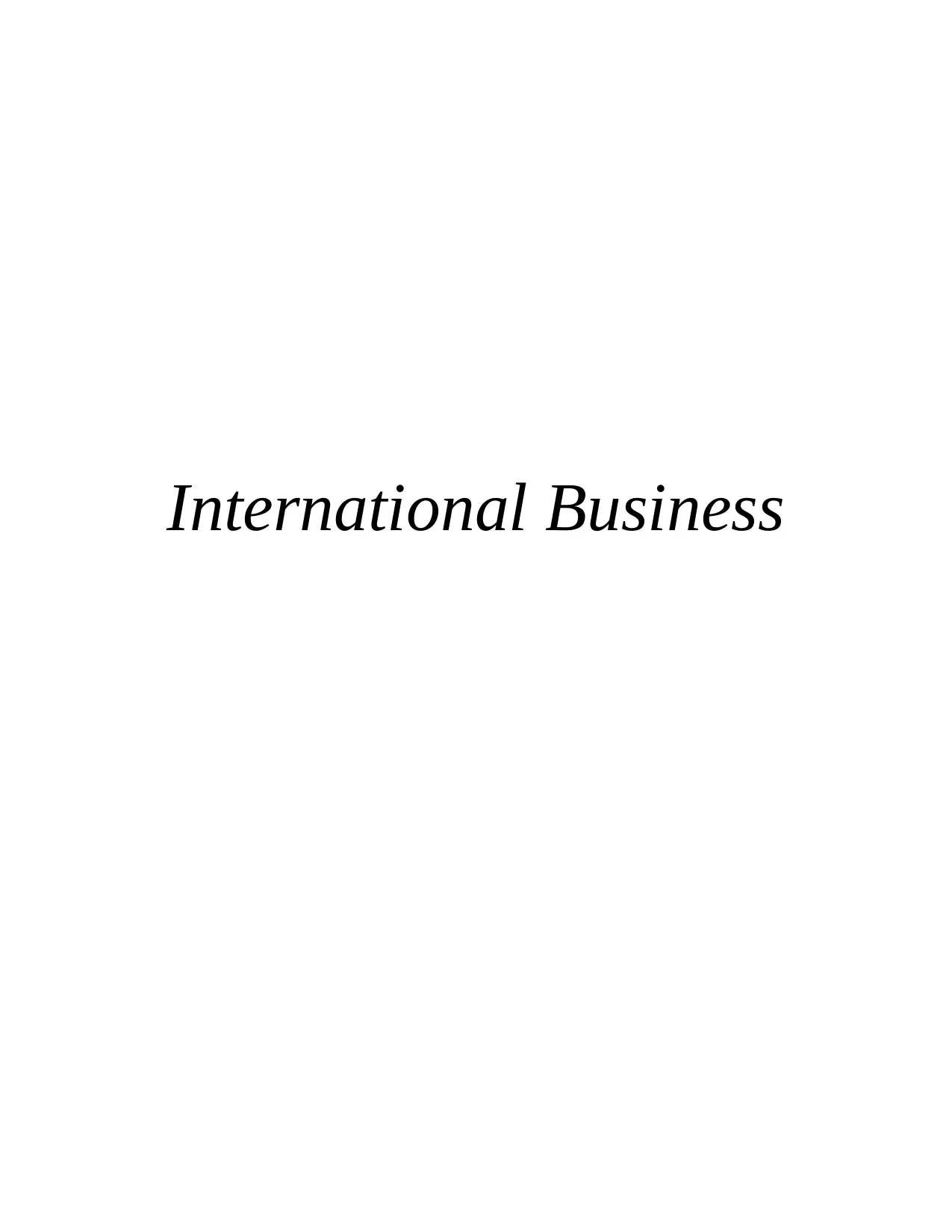
International Business
Secure Best Marks with AI Grader
Need help grading? Try our AI Grader for instant feedback on your assignments.
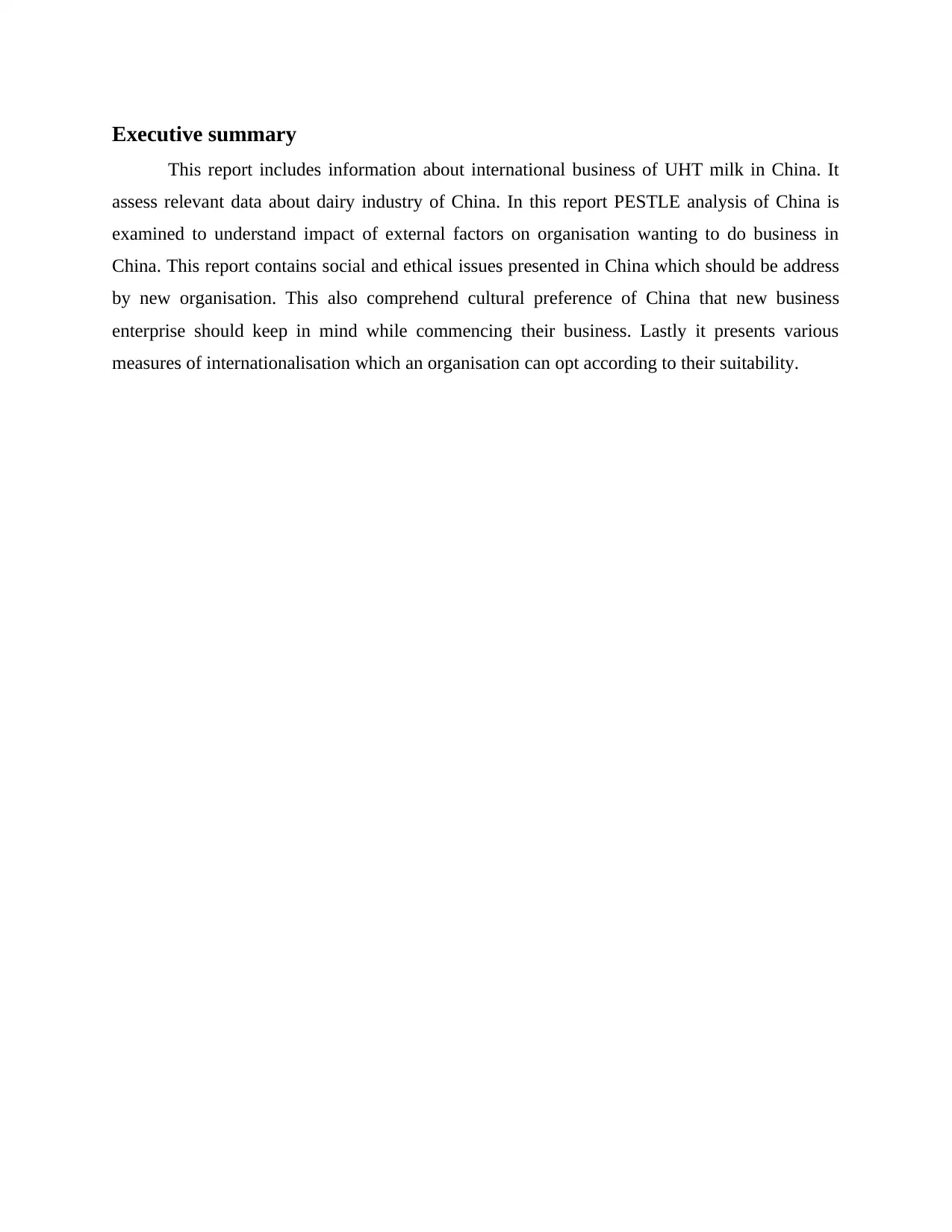
Executive summary
This report includes information about international business of UHT milk in China. It
assess relevant data about dairy industry of China. In this report PESTLE analysis of China is
examined to understand impact of external factors on organisation wanting to do business in
China. This report contains social and ethical issues presented in China which should be address
by new organisation. This also comprehend cultural preference of China that new business
enterprise should keep in mind while commencing their business. Lastly it presents various
measures of internationalisation which an organisation can opt according to their suitability.
This report includes information about international business of UHT milk in China. It
assess relevant data about dairy industry of China. In this report PESTLE analysis of China is
examined to understand impact of external factors on organisation wanting to do business in
China. This report contains social and ethical issues presented in China which should be address
by new organisation. This also comprehend cultural preference of China that new business
enterprise should keep in mind while commencing their business. Lastly it presents various
measures of internationalisation which an organisation can opt according to their suitability.
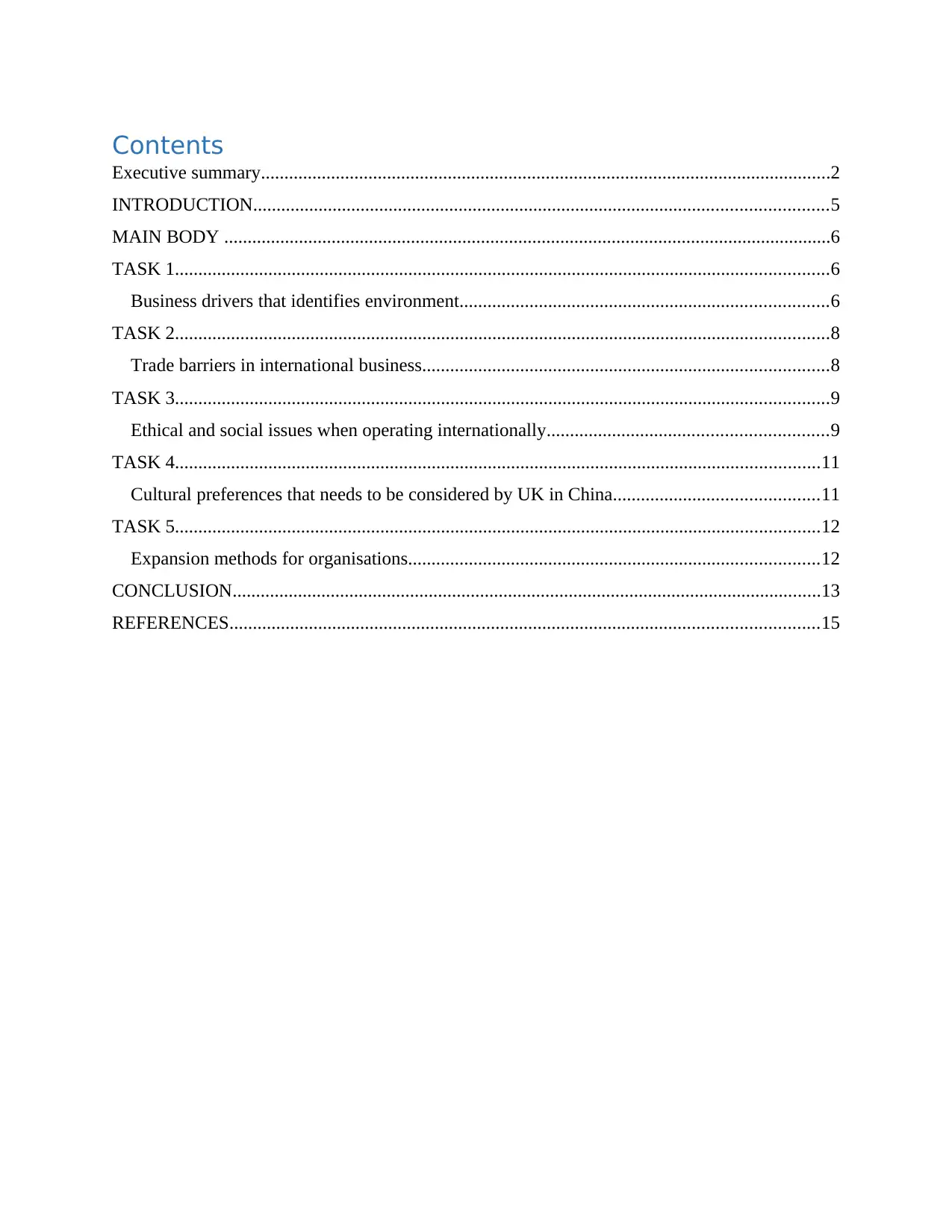
Contents
Executive summary..........................................................................................................................2
INTRODUCTION...........................................................................................................................5
MAIN BODY ..................................................................................................................................6
TASK 1............................................................................................................................................6
Business drivers that identifies environment...............................................................................6
TASK 2............................................................................................................................................8
Trade barriers in international business.......................................................................................8
TASK 3............................................................................................................................................9
Ethical and social issues when operating internationally............................................................9
TASK 4..........................................................................................................................................11
Cultural preferences that needs to be considered by UK in China............................................11
TASK 5..........................................................................................................................................12
Expansion methods for organisations........................................................................................12
CONCLUSION..............................................................................................................................13
REFERENCES..............................................................................................................................15
Executive summary..........................................................................................................................2
INTRODUCTION...........................................................................................................................5
MAIN BODY ..................................................................................................................................6
TASK 1............................................................................................................................................6
Business drivers that identifies environment...............................................................................6
TASK 2............................................................................................................................................8
Trade barriers in international business.......................................................................................8
TASK 3............................................................................................................................................9
Ethical and social issues when operating internationally............................................................9
TASK 4..........................................................................................................................................11
Cultural preferences that needs to be considered by UK in China............................................11
TASK 5..........................................................................................................................................12
Expansion methods for organisations........................................................................................12
CONCLUSION..............................................................................................................................13
REFERENCES..............................................................................................................................15

Secure Best Marks with AI Grader
Need help grading? Try our AI Grader for instant feedback on your assignments.
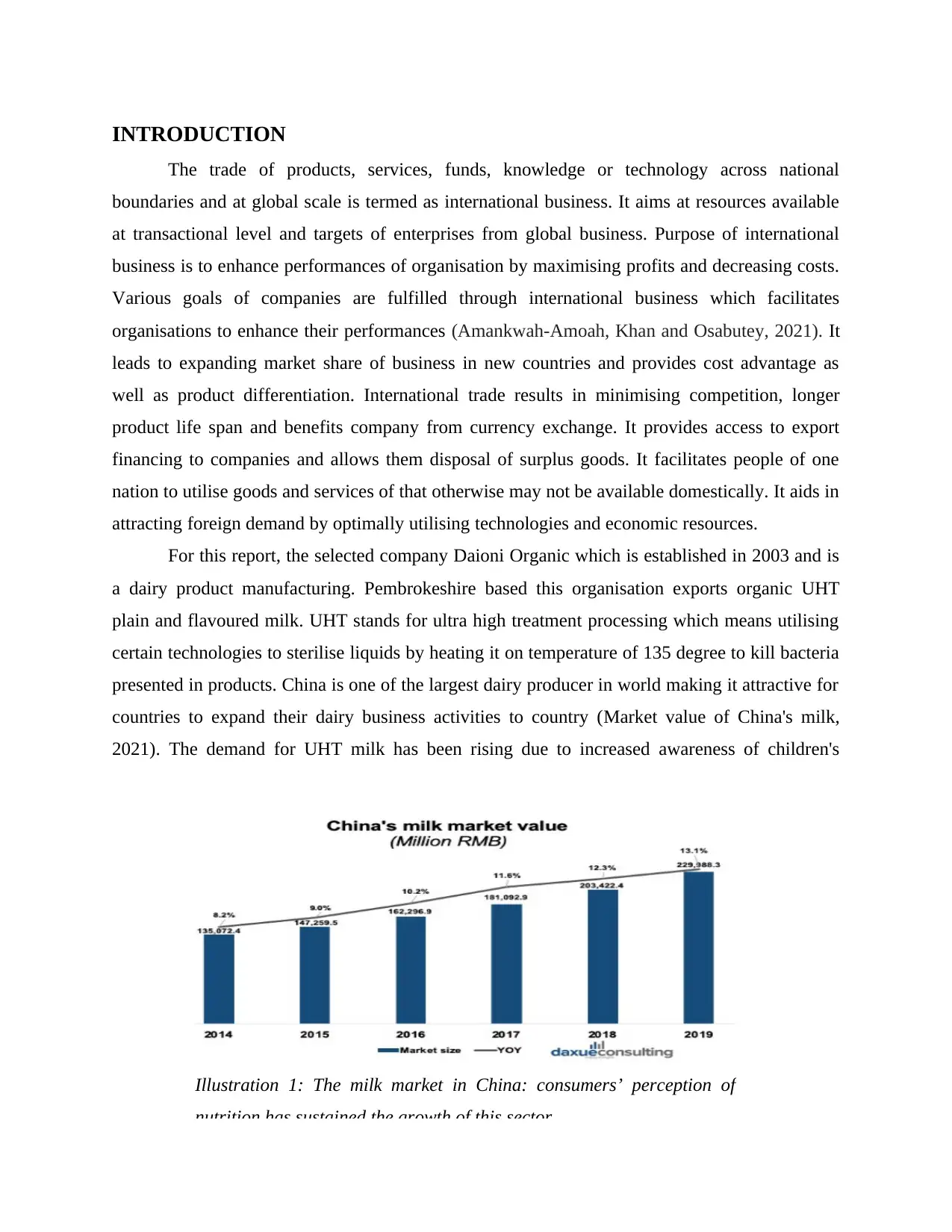
INTRODUCTION
The trade of products, services, funds, knowledge or technology across national
boundaries and at global scale is termed as international business. It aims at resources available
at transactional level and targets of enterprises from global business. Purpose of international
business is to enhance performances of organisation by maximising profits and decreasing costs.
Various goals of companies are fulfilled through international business which facilitates
organisations to enhance their performances (Amankwah-Amoah, Khan and Osabutey, 2021). It
leads to expanding market share of business in new countries and provides cost advantage as
well as product differentiation. International trade results in minimising competition, longer
product life span and benefits company from currency exchange. It provides access to export
financing to companies and allows them disposal of surplus goods. It facilitates people of one
nation to utilise goods and services of that otherwise may not be available domestically. It aids in
attracting foreign demand by optimally utilising technologies and economic resources.
For this report, the selected company Daioni Organic which is established in 2003 and is
a dairy product manufacturing. Pembrokeshire based this organisation exports organic UHT
plain and flavoured milk. UHT stands for ultra high treatment processing which means utilising
certain technologies to sterilise liquids by heating it on temperature of 135 degree to kill bacteria
presented in products. China is one of the largest dairy producer in world making it attractive for
countries to expand their dairy business activities to country (Market value of China's milk,
2021). The demand for UHT milk has been rising due to increased awareness of children's
Illustration 1: The milk market in China: consumers’ perception of
nutrition has sustained the growth of this sector
The trade of products, services, funds, knowledge or technology across national
boundaries and at global scale is termed as international business. It aims at resources available
at transactional level and targets of enterprises from global business. Purpose of international
business is to enhance performances of organisation by maximising profits and decreasing costs.
Various goals of companies are fulfilled through international business which facilitates
organisations to enhance their performances (Amankwah-Amoah, Khan and Osabutey, 2021). It
leads to expanding market share of business in new countries and provides cost advantage as
well as product differentiation. International trade results in minimising competition, longer
product life span and benefits company from currency exchange. It provides access to export
financing to companies and allows them disposal of surplus goods. It facilitates people of one
nation to utilise goods and services of that otherwise may not be available domestically. It aids in
attracting foreign demand by optimally utilising technologies and economic resources.
For this report, the selected company Daioni Organic which is established in 2003 and is
a dairy product manufacturing. Pembrokeshire based this organisation exports organic UHT
plain and flavoured milk. UHT stands for ultra high treatment processing which means utilising
certain technologies to sterilise liquids by heating it on temperature of 135 degree to kill bacteria
presented in products. China is one of the largest dairy producer in world making it attractive for
countries to expand their dairy business activities to country (Market value of China's milk,
2021). The demand for UHT milk has been rising due to increased awareness of children's
Illustration 1: The milk market in China: consumers’ perception of
nutrition has sustained the growth of this sector
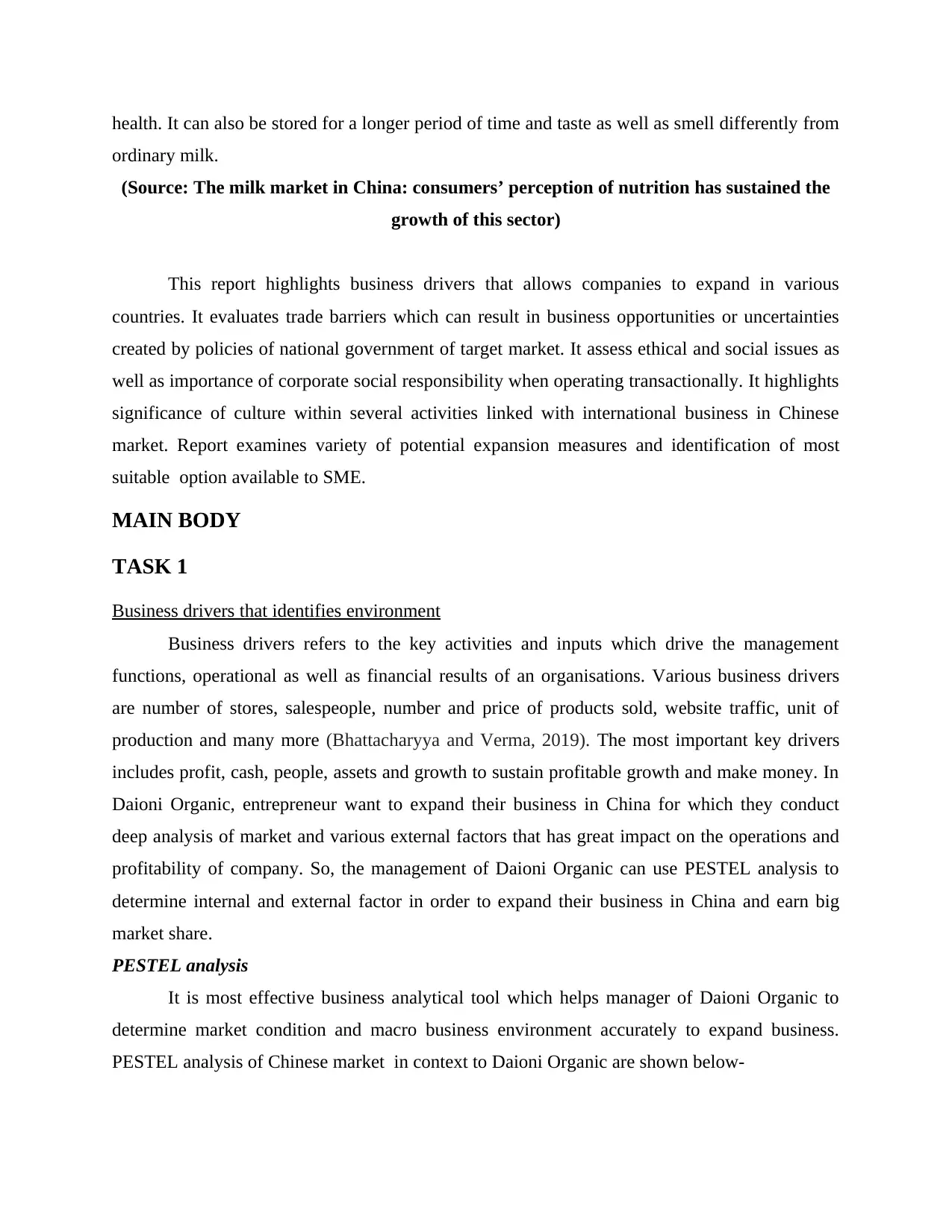
health. It can also be stored for a longer period of time and taste as well as smell differently from
ordinary milk.
(Source: The milk market in China: consumers’ perception of nutrition has sustained the
growth of this sector)
This report highlights business drivers that allows companies to expand in various
countries. It evaluates trade barriers which can result in business opportunities or uncertainties
created by policies of national government of target market. It assess ethical and social issues as
well as importance of corporate social responsibility when operating transactionally. It highlights
significance of culture within several activities linked with international business in Chinese
market. Report examines variety of potential expansion measures and identification of most
suitable option available to SME.
MAIN BODY
TASK 1
Business drivers that identifies environment
Business drivers refers to the key activities and inputs which drive the management
functions, operational as well as financial results of an organisations. Various business drivers
are number of stores, salespeople, number and price of products sold, website traffic, unit of
production and many more (Bhattacharyya and Verma, 2019). The most important key drivers
includes profit, cash, people, assets and growth to sustain profitable growth and make money. In
Daioni Organic, entrepreneur want to expand their business in China for which they conduct
deep analysis of market and various external factors that has great impact on the operations and
profitability of company. So, the management of Daioni Organic can use PESTEL analysis to
determine internal and external factor in order to expand their business in China and earn big
market share.
PESTEL analysis
It is most effective business analytical tool which helps manager of Daioni Organic to
determine market condition and macro business environment accurately to expand business.
PESTEL analysis of Chinese market in context to Daioni Organic are shown below-
ordinary milk.
(Source: The milk market in China: consumers’ perception of nutrition has sustained the
growth of this sector)
This report highlights business drivers that allows companies to expand in various
countries. It evaluates trade barriers which can result in business opportunities or uncertainties
created by policies of national government of target market. It assess ethical and social issues as
well as importance of corporate social responsibility when operating transactionally. It highlights
significance of culture within several activities linked with international business in Chinese
market. Report examines variety of potential expansion measures and identification of most
suitable option available to SME.
MAIN BODY
TASK 1
Business drivers that identifies environment
Business drivers refers to the key activities and inputs which drive the management
functions, operational as well as financial results of an organisations. Various business drivers
are number of stores, salespeople, number and price of products sold, website traffic, unit of
production and many more (Bhattacharyya and Verma, 2019). The most important key drivers
includes profit, cash, people, assets and growth to sustain profitable growth and make money. In
Daioni Organic, entrepreneur want to expand their business in China for which they conduct
deep analysis of market and various external factors that has great impact on the operations and
profitability of company. So, the management of Daioni Organic can use PESTEL analysis to
determine internal and external factor in order to expand their business in China and earn big
market share.
PESTEL analysis
It is most effective business analytical tool which helps manager of Daioni Organic to
determine market condition and macro business environment accurately to expand business.
PESTEL analysis of Chinese market in context to Daioni Organic are shown below-
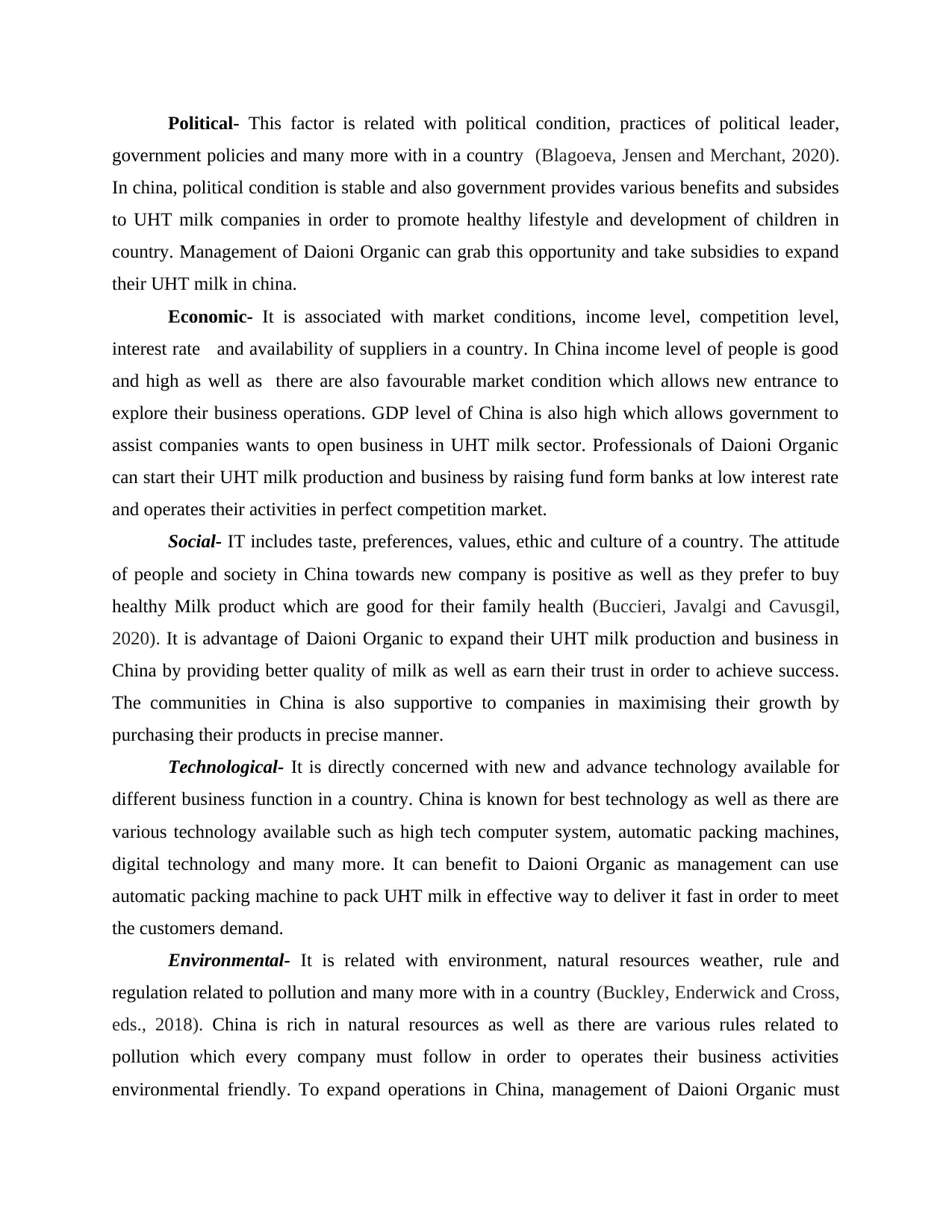
Political- This factor is related with political condition, practices of political leader,
government policies and many more with in a country (Blagoeva, Jensen and Merchant, 2020).
In china, political condition is stable and also government provides various benefits and subsides
to UHT milk companies in order to promote healthy lifestyle and development of children in
country. Management of Daioni Organic can grab this opportunity and take subsidies to expand
their UHT milk in china.
Economic- It is associated with market conditions, income level, competition level,
interest rate and availability of suppliers in a country. In China income level of people is good
and high as well as there are also favourable market condition which allows new entrance to
explore their business operations. GDP level of China is also high which allows government to
assist companies wants to open business in UHT milk sector. Professionals of Daioni Organic
can start their UHT milk production and business by raising fund form banks at low interest rate
and operates their activities in perfect competition market.
Social- IT includes taste, preferences, values, ethic and culture of a country. The attitude
of people and society in China towards new company is positive as well as they prefer to buy
healthy Milk product which are good for their family health (Buccieri, Javalgi and Cavusgil,
2020). It is advantage of Daioni Organic to expand their UHT milk production and business in
China by providing better quality of milk as well as earn their trust in order to achieve success.
The communities in China is also supportive to companies in maximising their growth by
purchasing their products in precise manner.
Technological- It is directly concerned with new and advance technology available for
different business function in a country. China is known for best technology as well as there are
various technology available such as high tech computer system, automatic packing machines,
digital technology and many more. It can benefit to Daioni Organic as management can use
automatic packing machine to pack UHT milk in effective way to deliver it fast in order to meet
the customers demand.
Environmental- It is related with environment, natural resources weather, rule and
regulation related to pollution and many more with in a country (Buckley, Enderwick and Cross,
eds., 2018). China is rich in natural resources as well as there are various rules related to
pollution which every company must follow in order to operates their business activities
environmental friendly. To expand operations in China, management of Daioni Organic must
government policies and many more with in a country (Blagoeva, Jensen and Merchant, 2020).
In china, political condition is stable and also government provides various benefits and subsides
to UHT milk companies in order to promote healthy lifestyle and development of children in
country. Management of Daioni Organic can grab this opportunity and take subsidies to expand
their UHT milk in china.
Economic- It is associated with market conditions, income level, competition level,
interest rate and availability of suppliers in a country. In China income level of people is good
and high as well as there are also favourable market condition which allows new entrance to
explore their business operations. GDP level of China is also high which allows government to
assist companies wants to open business in UHT milk sector. Professionals of Daioni Organic
can start their UHT milk production and business by raising fund form banks at low interest rate
and operates their activities in perfect competition market.
Social- IT includes taste, preferences, values, ethic and culture of a country. The attitude
of people and society in China towards new company is positive as well as they prefer to buy
healthy Milk product which are good for their family health (Buccieri, Javalgi and Cavusgil,
2020). It is advantage of Daioni Organic to expand their UHT milk production and business in
China by providing better quality of milk as well as earn their trust in order to achieve success.
The communities in China is also supportive to companies in maximising their growth by
purchasing their products in precise manner.
Technological- It is directly concerned with new and advance technology available for
different business function in a country. China is known for best technology as well as there are
various technology available such as high tech computer system, automatic packing machines,
digital technology and many more. It can benefit to Daioni Organic as management can use
automatic packing machine to pack UHT milk in effective way to deliver it fast in order to meet
the customers demand.
Environmental- It is related with environment, natural resources weather, rule and
regulation related to pollution and many more with in a country (Buckley, Enderwick and Cross,
eds., 2018). China is rich in natural resources as well as there are various rules related to
pollution which every company must follow in order to operates their business activities
environmental friendly. To expand operations in China, management of Daioni Organic must
Paraphrase This Document
Need a fresh take? Get an instant paraphrase of this document with our AI Paraphraser
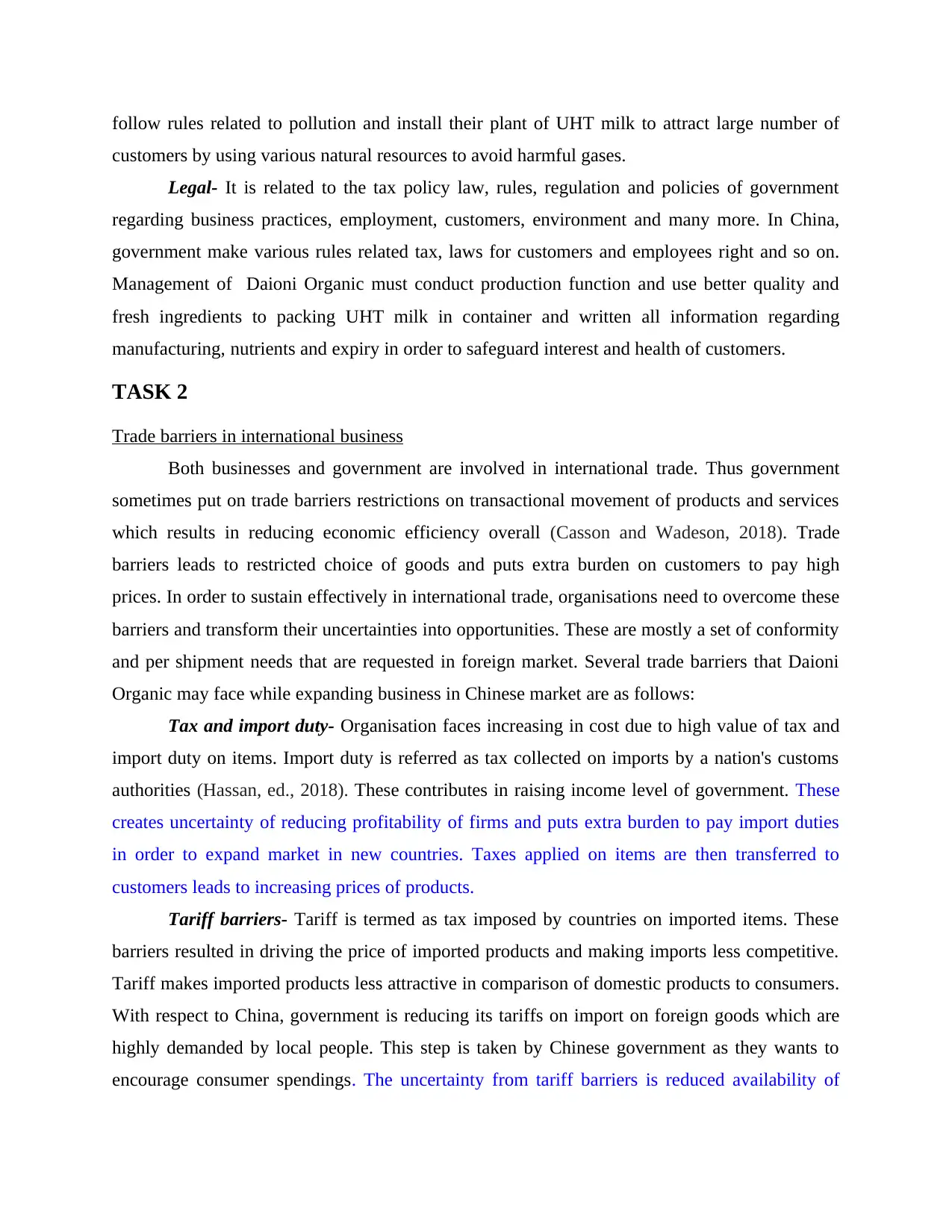
follow rules related to pollution and install their plant of UHT milk to attract large number of
customers by using various natural resources to avoid harmful gases.
Legal- It is related to the tax policy law, rules, regulation and policies of government
regarding business practices, employment, customers, environment and many more. In China,
government make various rules related tax, laws for customers and employees right and so on.
Management of Daioni Organic must conduct production function and use better quality and
fresh ingredients to packing UHT milk in container and written all information regarding
manufacturing, nutrients and expiry in order to safeguard interest and health of customers.
TASK 2
Trade barriers in international business
Both businesses and government are involved in international trade. Thus government
sometimes put on trade barriers restrictions on transactional movement of products and services
which results in reducing economic efficiency overall (Casson and Wadeson, 2018). Trade
barriers leads to restricted choice of goods and puts extra burden on customers to pay high
prices. In order to sustain effectively in international trade, organisations need to overcome these
barriers and transform their uncertainties into opportunities. These are mostly a set of conformity
and per shipment needs that are requested in foreign market. Several trade barriers that Daioni
Organic may face while expanding business in Chinese market are as follows:
Tax and import duty- Organisation faces increasing in cost due to high value of tax and
import duty on items. Import duty is referred as tax collected on imports by a nation's customs
authorities (Hassan, ed., 2018). These contributes in raising income level of government. These
creates uncertainty of reducing profitability of firms and puts extra burden to pay import duties
in order to expand market in new countries. Taxes applied on items are then transferred to
customers leads to increasing prices of products.
Tariff barriers- Tariff is termed as tax imposed by countries on imported items. These
barriers resulted in driving the price of imported products and making imports less competitive.
Tariff makes imported products less attractive in comparison of domestic products to consumers.
With respect to China, government is reducing its tariffs on import on foreign goods which are
highly demanded by local people. This step is taken by Chinese government as they wants to
encourage consumer spendings. The uncertainty from tariff barriers is reduced availability of
customers by using various natural resources to avoid harmful gases.
Legal- It is related to the tax policy law, rules, regulation and policies of government
regarding business practices, employment, customers, environment and many more. In China,
government make various rules related tax, laws for customers and employees right and so on.
Management of Daioni Organic must conduct production function and use better quality and
fresh ingredients to packing UHT milk in container and written all information regarding
manufacturing, nutrients and expiry in order to safeguard interest and health of customers.
TASK 2
Trade barriers in international business
Both businesses and government are involved in international trade. Thus government
sometimes put on trade barriers restrictions on transactional movement of products and services
which results in reducing economic efficiency overall (Casson and Wadeson, 2018). Trade
barriers leads to restricted choice of goods and puts extra burden on customers to pay high
prices. In order to sustain effectively in international trade, organisations need to overcome these
barriers and transform their uncertainties into opportunities. These are mostly a set of conformity
and per shipment needs that are requested in foreign market. Several trade barriers that Daioni
Organic may face while expanding business in Chinese market are as follows:
Tax and import duty- Organisation faces increasing in cost due to high value of tax and
import duty on items. Import duty is referred as tax collected on imports by a nation's customs
authorities (Hassan, ed., 2018). These contributes in raising income level of government. These
creates uncertainty of reducing profitability of firms and puts extra burden to pay import duties
in order to expand market in new countries. Taxes applied on items are then transferred to
customers leads to increasing prices of products.
Tariff barriers- Tariff is termed as tax imposed by countries on imported items. These
barriers resulted in driving the price of imported products and making imports less competitive.
Tariff makes imported products less attractive in comparison of domestic products to consumers.
With respect to China, government is reducing its tariffs on import on foreign goods which are
highly demanded by local people. This step is taken by Chinese government as they wants to
encourage consumer spendings. The uncertainty from tariff barriers is reduced availability of
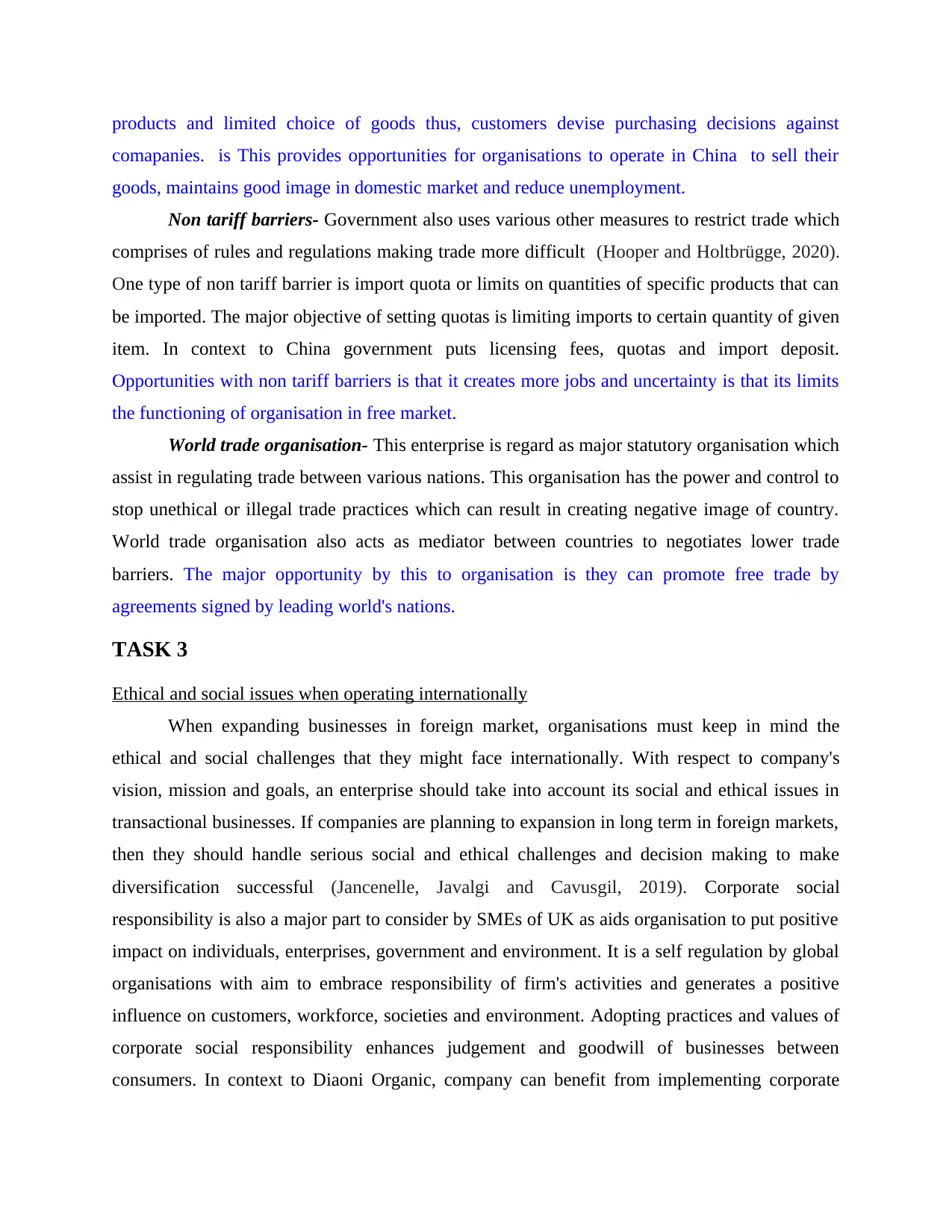
products and limited choice of goods thus, customers devise purchasing decisions against
comapanies. is This provides opportunities for organisations to operate in China to sell their
goods, maintains good image in domestic market and reduce unemployment.
Non tariff barriers- Government also uses various other measures to restrict trade which
comprises of rules and regulations making trade more difficult (Hooper and Holtbrügge, 2020).
One type of non tariff barrier is import quota or limits on quantities of specific products that can
be imported. The major objective of setting quotas is limiting imports to certain quantity of given
item. In context to China government puts licensing fees, quotas and import deposit.
Opportunities with non tariff barriers is that it creates more jobs and uncertainty is that its limits
the functioning of organisation in free market.
World trade organisation- This enterprise is regard as major statutory organisation which
assist in regulating trade between various nations. This organisation has the power and control to
stop unethical or illegal trade practices which can result in creating negative image of country.
World trade organisation also acts as mediator between countries to negotiates lower trade
barriers. The major opportunity by this to organisation is they can promote free trade by
agreements signed by leading world's nations.
TASK 3
Ethical and social issues when operating internationally
When expanding businesses in foreign market, organisations must keep in mind the
ethical and social challenges that they might face internationally. With respect to company's
vision, mission and goals, an enterprise should take into account its social and ethical issues in
transactional businesses. If companies are planning to expansion in long term in foreign markets,
then they should handle serious social and ethical challenges and decision making to make
diversification successful (Jancenelle, Javalgi and Cavusgil, 2019). Corporate social
responsibility is also a major part to consider by SMEs of UK as aids organisation to put positive
impact on individuals, enterprises, government and environment. It is a self regulation by global
organisations with aim to embrace responsibility of firm's activities and generates a positive
influence on customers, workforce, societies and environment. Adopting practices and values of
corporate social responsibility enhances judgement and goodwill of businesses between
consumers. In context to Diaoni Organic, company can benefit from implementing corporate
comapanies. is This provides opportunities for organisations to operate in China to sell their
goods, maintains good image in domestic market and reduce unemployment.
Non tariff barriers- Government also uses various other measures to restrict trade which
comprises of rules and regulations making trade more difficult (Hooper and Holtbrügge, 2020).
One type of non tariff barrier is import quota or limits on quantities of specific products that can
be imported. The major objective of setting quotas is limiting imports to certain quantity of given
item. In context to China government puts licensing fees, quotas and import deposit.
Opportunities with non tariff barriers is that it creates more jobs and uncertainty is that its limits
the functioning of organisation in free market.
World trade organisation- This enterprise is regard as major statutory organisation which
assist in regulating trade between various nations. This organisation has the power and control to
stop unethical or illegal trade practices which can result in creating negative image of country.
World trade organisation also acts as mediator between countries to negotiates lower trade
barriers. The major opportunity by this to organisation is they can promote free trade by
agreements signed by leading world's nations.
TASK 3
Ethical and social issues when operating internationally
When expanding businesses in foreign market, organisations must keep in mind the
ethical and social challenges that they might face internationally. With respect to company's
vision, mission and goals, an enterprise should take into account its social and ethical issues in
transactional businesses. If companies are planning to expansion in long term in foreign markets,
then they should handle serious social and ethical challenges and decision making to make
diversification successful (Jancenelle, Javalgi and Cavusgil, 2019). Corporate social
responsibility is also a major part to consider by SMEs of UK as aids organisation to put positive
impact on individuals, enterprises, government and environment. It is a self regulation by global
organisations with aim to embrace responsibility of firm's activities and generates a positive
influence on customers, workforce, societies and environment. Adopting practices and values of
corporate social responsibility enhances judgement and goodwill of businesses between
consumers. In context to Diaoni Organic, company can benefit from implementing corporate
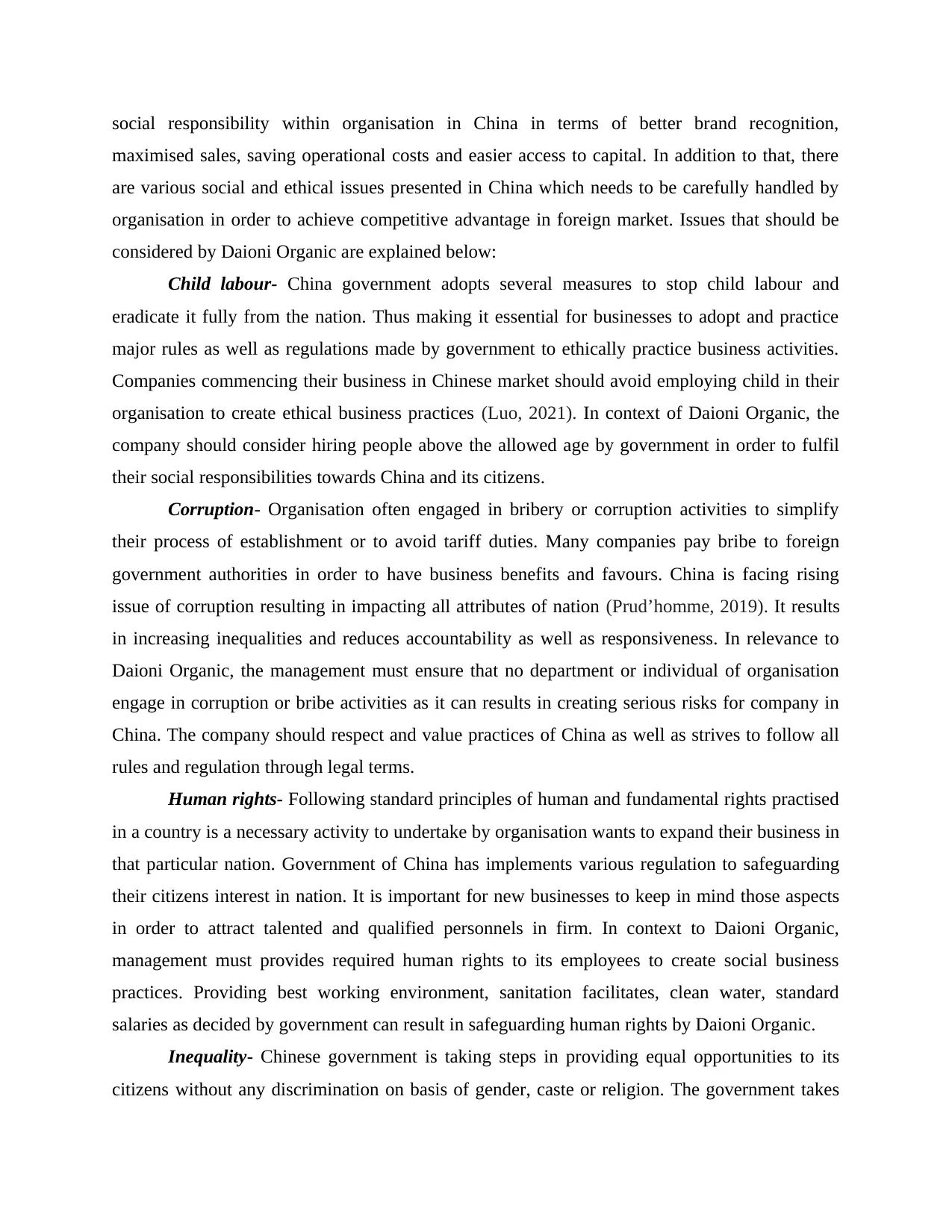
social responsibility within organisation in China in terms of better brand recognition,
maximised sales, saving operational costs and easier access to capital. In addition to that, there
are various social and ethical issues presented in China which needs to be carefully handled by
organisation in order to achieve competitive advantage in foreign market. Issues that should be
considered by Daioni Organic are explained below:
Child labour- China government adopts several measures to stop child labour and
eradicate it fully from the nation. Thus making it essential for businesses to adopt and practice
major rules as well as regulations made by government to ethically practice business activities.
Companies commencing their business in Chinese market should avoid employing child in their
organisation to create ethical business practices (Luo, 2021). In context of Daioni Organic, the
company should consider hiring people above the allowed age by government in order to fulfil
their social responsibilities towards China and its citizens.
Corruption- Organisation often engaged in bribery or corruption activities to simplify
their process of establishment or to avoid tariff duties. Many companies pay bribe to foreign
government authorities in order to have business benefits and favours. China is facing rising
issue of corruption resulting in impacting all attributes of nation (Prud’homme, 2019). It results
in increasing inequalities and reduces accountability as well as responsiveness. In relevance to
Daioni Organic, the management must ensure that no department or individual of organisation
engage in corruption or bribe activities as it can results in creating serious risks for company in
China. The company should respect and value practices of China as well as strives to follow all
rules and regulation through legal terms.
Human rights- Following standard principles of human and fundamental rights practised
in a country is a necessary activity to undertake by organisation wants to expand their business in
that particular nation. Government of China has implements various regulation to safeguarding
their citizens interest in nation. It is important for new businesses to keep in mind those aspects
in order to attract talented and qualified personnels in firm. In context to Daioni Organic,
management must provides required human rights to its employees to create social business
practices. Providing best working environment, sanitation facilitates, clean water, standard
salaries as decided by government can result in safeguarding human rights by Daioni Organic.
Inequality- Chinese government is taking steps in providing equal opportunities to its
citizens without any discrimination on basis of gender, caste or religion. The government takes
maximised sales, saving operational costs and easier access to capital. In addition to that, there
are various social and ethical issues presented in China which needs to be carefully handled by
organisation in order to achieve competitive advantage in foreign market. Issues that should be
considered by Daioni Organic are explained below:
Child labour- China government adopts several measures to stop child labour and
eradicate it fully from the nation. Thus making it essential for businesses to adopt and practice
major rules as well as regulations made by government to ethically practice business activities.
Companies commencing their business in Chinese market should avoid employing child in their
organisation to create ethical business practices (Luo, 2021). In context of Daioni Organic, the
company should consider hiring people above the allowed age by government in order to fulfil
their social responsibilities towards China and its citizens.
Corruption- Organisation often engaged in bribery or corruption activities to simplify
their process of establishment or to avoid tariff duties. Many companies pay bribe to foreign
government authorities in order to have business benefits and favours. China is facing rising
issue of corruption resulting in impacting all attributes of nation (Prud’homme, 2019). It results
in increasing inequalities and reduces accountability as well as responsiveness. In relevance to
Daioni Organic, the management must ensure that no department or individual of organisation
engage in corruption or bribe activities as it can results in creating serious risks for company in
China. The company should respect and value practices of China as well as strives to follow all
rules and regulation through legal terms.
Human rights- Following standard principles of human and fundamental rights practised
in a country is a necessary activity to undertake by organisation wants to expand their business in
that particular nation. Government of China has implements various regulation to safeguarding
their citizens interest in nation. It is important for new businesses to keep in mind those aspects
in order to attract talented and qualified personnels in firm. In context to Daioni Organic,
management must provides required human rights to its employees to create social business
practices. Providing best working environment, sanitation facilitates, clean water, standard
salaries as decided by government can result in safeguarding human rights by Daioni Organic.
Inequality- Chinese government is taking steps in providing equal opportunities to its
citizens without any discrimination on basis of gender, caste or religion. The government takes
Secure Best Marks with AI Grader
Need help grading? Try our AI Grader for instant feedback on your assignments.
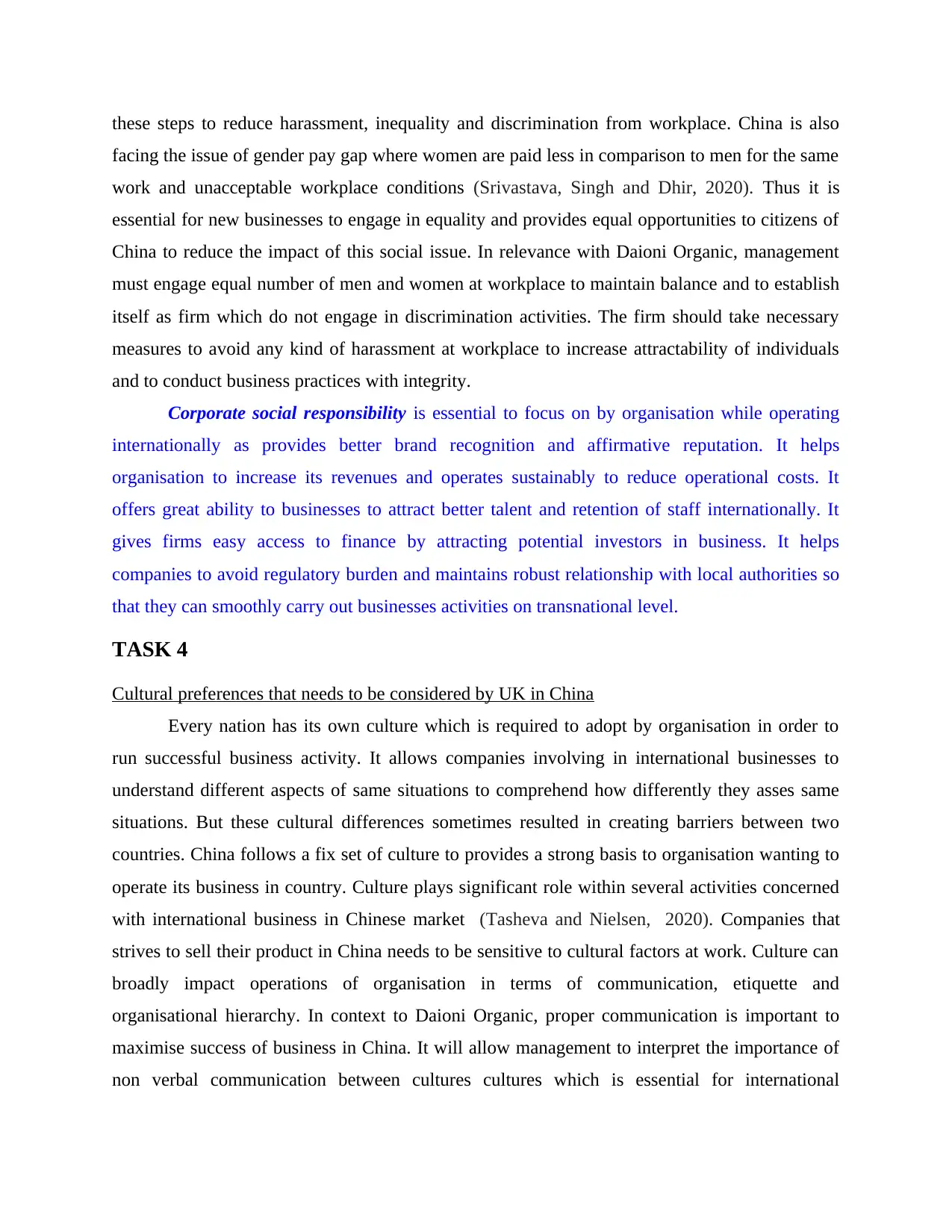
these steps to reduce harassment, inequality and discrimination from workplace. China is also
facing the issue of gender pay gap where women are paid less in comparison to men for the same
work and unacceptable workplace conditions (Srivastava, Singh and Dhir, 2020). Thus it is
essential for new businesses to engage in equality and provides equal opportunities to citizens of
China to reduce the impact of this social issue. In relevance with Daioni Organic, management
must engage equal number of men and women at workplace to maintain balance and to establish
itself as firm which do not engage in discrimination activities. The firm should take necessary
measures to avoid any kind of harassment at workplace to increase attractability of individuals
and to conduct business practices with integrity.
Corporate social responsibility is essential to focus on by organisation while operating
internationally as provides better brand recognition and affirmative reputation. It helps
organisation to increase its revenues and operates sustainably to reduce operational costs. It
offers great ability to businesses to attract better talent and retention of staff internationally. It
gives firms easy access to finance by attracting potential investors in business. It helps
companies to avoid regulatory burden and maintains robust relationship with local authorities so
that they can smoothly carry out businesses activities on transnational level.
TASK 4
Cultural preferences that needs to be considered by UK in China
Every nation has its own culture which is required to adopt by organisation in order to
run successful business activity. It allows companies involving in international businesses to
understand different aspects of same situations to comprehend how differently they asses same
situations. But these cultural differences sometimes resulted in creating barriers between two
countries. China follows a fix set of culture to provides a strong basis to organisation wanting to
operate its business in country. Culture plays significant role within several activities concerned
with international business in Chinese market (Tasheva and Nielsen, 2020). Companies that
strives to sell their product in China needs to be sensitive to cultural factors at work. Culture can
broadly impact operations of organisation in terms of communication, etiquette and
organisational hierarchy. In context to Daioni Organic, proper communication is important to
maximise success of business in China. It will allow management to interpret the importance of
non verbal communication between cultures cultures which is essential for international
facing the issue of gender pay gap where women are paid less in comparison to men for the same
work and unacceptable workplace conditions (Srivastava, Singh and Dhir, 2020). Thus it is
essential for new businesses to engage in equality and provides equal opportunities to citizens of
China to reduce the impact of this social issue. In relevance with Daioni Organic, management
must engage equal number of men and women at workplace to maintain balance and to establish
itself as firm which do not engage in discrimination activities. The firm should take necessary
measures to avoid any kind of harassment at workplace to increase attractability of individuals
and to conduct business practices with integrity.
Corporate social responsibility is essential to focus on by organisation while operating
internationally as provides better brand recognition and affirmative reputation. It helps
organisation to increase its revenues and operates sustainably to reduce operational costs. It
offers great ability to businesses to attract better talent and retention of staff internationally. It
gives firms easy access to finance by attracting potential investors in business. It helps
companies to avoid regulatory burden and maintains robust relationship with local authorities so
that they can smoothly carry out businesses activities on transnational level.
TASK 4
Cultural preferences that needs to be considered by UK in China
Every nation has its own culture which is required to adopt by organisation in order to
run successful business activity. It allows companies involving in international businesses to
understand different aspects of same situations to comprehend how differently they asses same
situations. But these cultural differences sometimes resulted in creating barriers between two
countries. China follows a fix set of culture to provides a strong basis to organisation wanting to
operate its business in country. Culture plays significant role within several activities concerned
with international business in Chinese market (Tasheva and Nielsen, 2020). Companies that
strives to sell their product in China needs to be sensitive to cultural factors at work. Culture can
broadly impact operations of organisation in terms of communication, etiquette and
organisational hierarchy. In context to Daioni Organic, proper communication is important to
maximise success of business in China. It will allow management to interpret the importance of
non verbal communication between cultures cultures which is essential for international
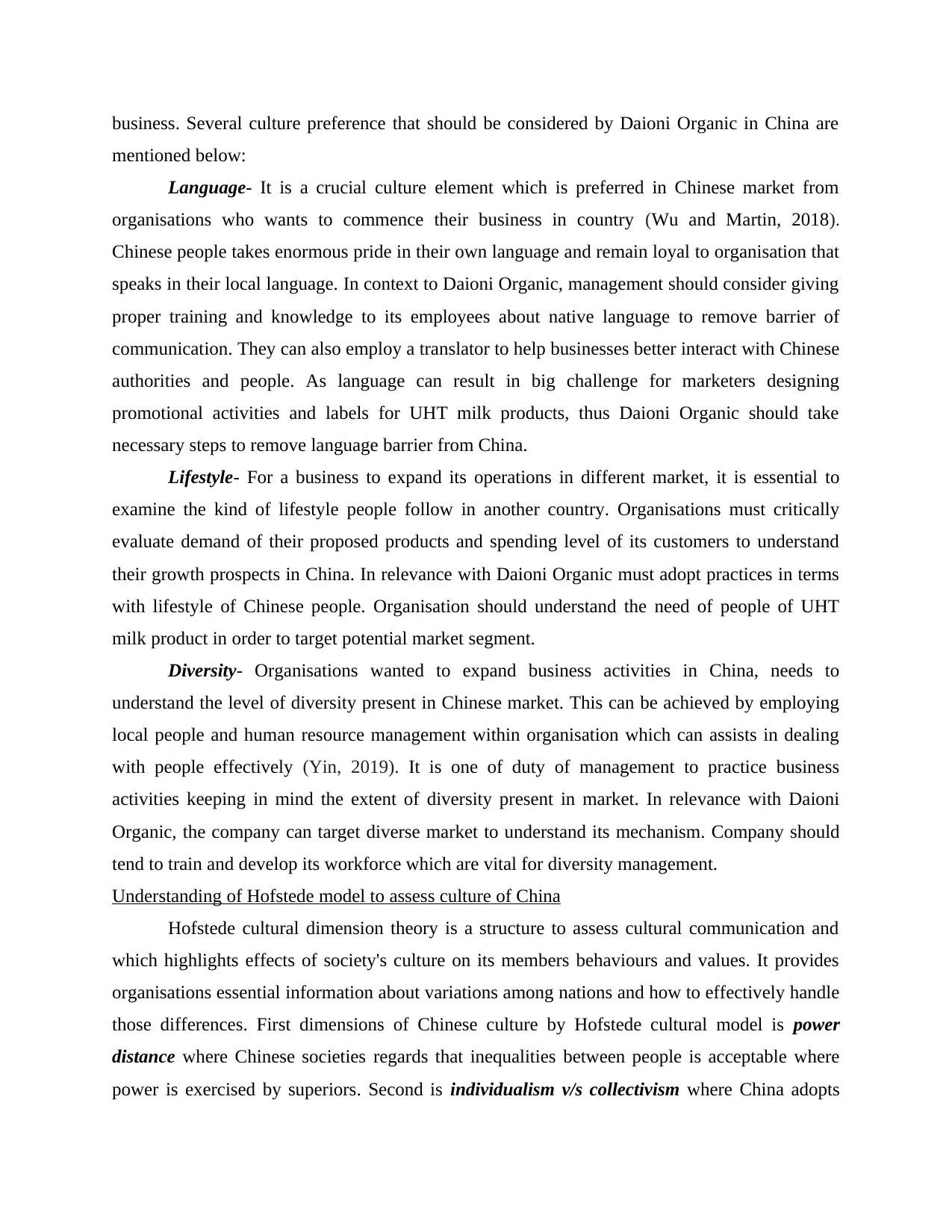
business. Several culture preference that should be considered by Daioni Organic in China are
mentioned below:
Language- It is a crucial culture element which is preferred in Chinese market from
organisations who wants to commence their business in country (Wu and Martin, 2018).
Chinese people takes enormous pride in their own language and remain loyal to organisation that
speaks in their local language. In context to Daioni Organic, management should consider giving
proper training and knowledge to its employees about native language to remove barrier of
communication. They can also employ a translator to help businesses better interact with Chinese
authorities and people. As language can result in big challenge for marketers designing
promotional activities and labels for UHT milk products, thus Daioni Organic should take
necessary steps to remove language barrier from China.
Lifestyle- For a business to expand its operations in different market, it is essential to
examine the kind of lifestyle people follow in another country. Organisations must critically
evaluate demand of their proposed products and spending level of its customers to understand
their growth prospects in China. In relevance with Daioni Organic must adopt practices in terms
with lifestyle of Chinese people. Organisation should understand the need of people of UHT
milk product in order to target potential market segment.
Diversity- Organisations wanted to expand business activities in China, needs to
understand the level of diversity present in Chinese market. This can be achieved by employing
local people and human resource management within organisation which can assists in dealing
with people effectively (Yin, 2019). It is one of duty of management to practice business
activities keeping in mind the extent of diversity present in market. In relevance with Daioni
Organic, the company can target diverse market to understand its mechanism. Company should
tend to train and develop its workforce which are vital for diversity management.
Understanding of Hofstede model to assess culture of China
Hofstede cultural dimension theory is a structure to assess cultural communication and
which highlights effects of society's culture on its members behaviours and values. It provides
organisations essential information about variations among nations and how to effectively handle
those differences. First dimensions of Chinese culture by Hofstede cultural model is power
distance where Chinese societies regards that inequalities between people is acceptable where
power is exercised by superiors. Second is individualism v/s collectivism where China adopts
mentioned below:
Language- It is a crucial culture element which is preferred in Chinese market from
organisations who wants to commence their business in country (Wu and Martin, 2018).
Chinese people takes enormous pride in their own language and remain loyal to organisation that
speaks in their local language. In context to Daioni Organic, management should consider giving
proper training and knowledge to its employees about native language to remove barrier of
communication. They can also employ a translator to help businesses better interact with Chinese
authorities and people. As language can result in big challenge for marketers designing
promotional activities and labels for UHT milk products, thus Daioni Organic should take
necessary steps to remove language barrier from China.
Lifestyle- For a business to expand its operations in different market, it is essential to
examine the kind of lifestyle people follow in another country. Organisations must critically
evaluate demand of their proposed products and spending level of its customers to understand
their growth prospects in China. In relevance with Daioni Organic must adopt practices in terms
with lifestyle of Chinese people. Organisation should understand the need of people of UHT
milk product in order to target potential market segment.
Diversity- Organisations wanted to expand business activities in China, needs to
understand the level of diversity present in Chinese market. This can be achieved by employing
local people and human resource management within organisation which can assists in dealing
with people effectively (Yin, 2019). It is one of duty of management to practice business
activities keeping in mind the extent of diversity present in market. In relevance with Daioni
Organic, the company can target diverse market to understand its mechanism. Company should
tend to train and develop its workforce which are vital for diversity management.
Understanding of Hofstede model to assess culture of China
Hofstede cultural dimension theory is a structure to assess cultural communication and
which highlights effects of society's culture on its members behaviours and values. It provides
organisations essential information about variations among nations and how to effectively handle
those differences. First dimensions of Chinese culture by Hofstede cultural model is power
distance where Chinese societies regards that inequalities between people is acceptable where
power is exercised by superiors. Second is individualism v/s collectivism where China adopts
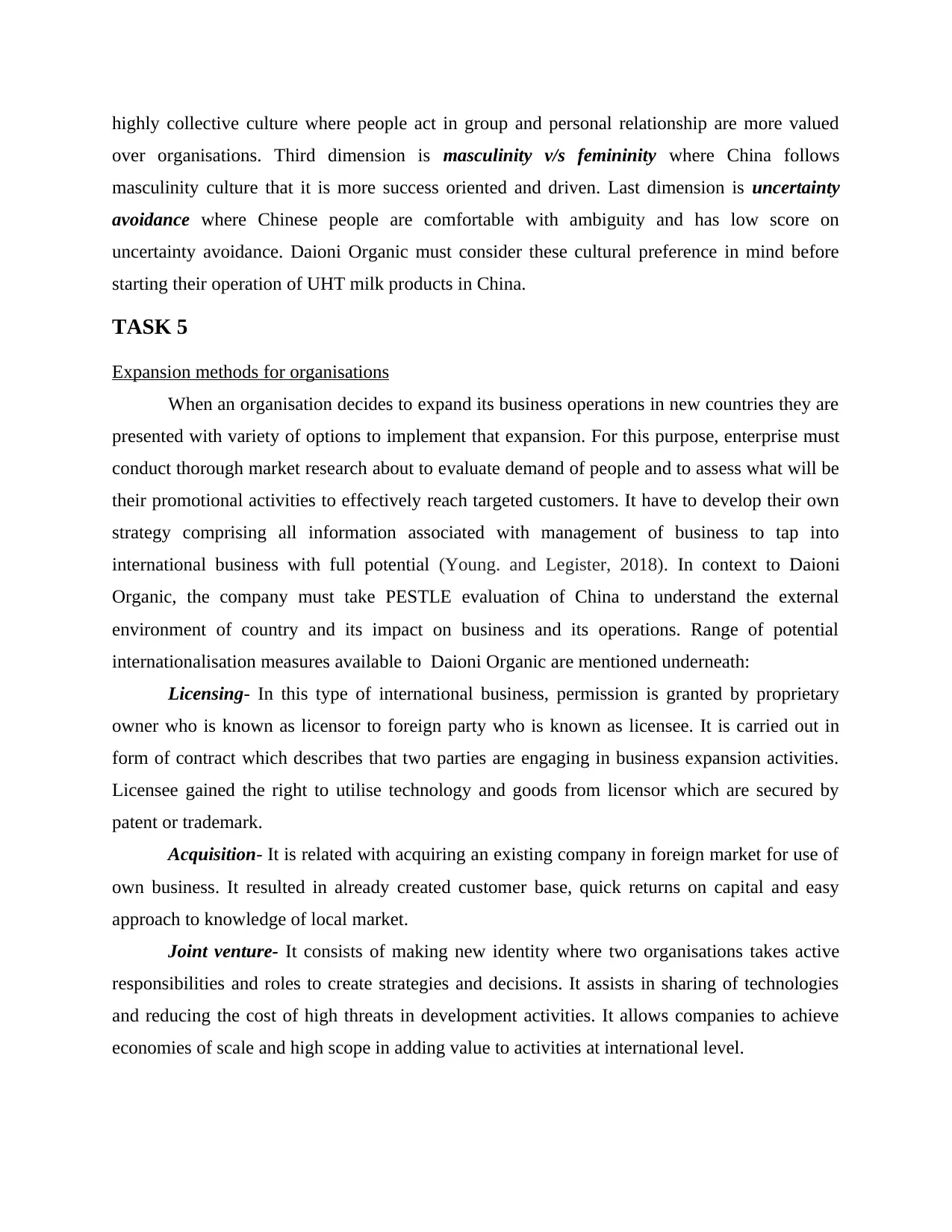
highly collective culture where people act in group and personal relationship are more valued
over organisations. Third dimension is masculinity v/s femininity where China follows
masculinity culture that it is more success oriented and driven. Last dimension is uncertainty
avoidance where Chinese people are comfortable with ambiguity and has low score on
uncertainty avoidance. Daioni Organic must consider these cultural preference in mind before
starting their operation of UHT milk products in China.
TASK 5
Expansion methods for organisations
When an organisation decides to expand its business operations in new countries they are
presented with variety of options to implement that expansion. For this purpose, enterprise must
conduct thorough market research about to evaluate demand of people and to assess what will be
their promotional activities to effectively reach targeted customers. It have to develop their own
strategy comprising all information associated with management of business to tap into
international business with full potential (Young. and Legister, 2018). In context to Daioni
Organic, the company must take PESTLE evaluation of China to understand the external
environment of country and its impact on business and its operations. Range of potential
internationalisation measures available to Daioni Organic are mentioned underneath:
Licensing- In this type of international business, permission is granted by proprietary
owner who is known as licensor to foreign party who is known as licensee. It is carried out in
form of contract which describes that two parties are engaging in business expansion activities.
Licensee gained the right to utilise technology and goods from licensor which are secured by
patent or trademark.
Acquisition- It is related with acquiring an existing company in foreign market for use of
own business. It resulted in already created customer base, quick returns on capital and easy
approach to knowledge of local market.
Joint venture- It consists of making new identity where two organisations takes active
responsibilities and roles to create strategies and decisions. It assists in sharing of technologies
and reducing the cost of high threats in development activities. It allows companies to achieve
economies of scale and high scope in adding value to activities at international level.
over organisations. Third dimension is masculinity v/s femininity where China follows
masculinity culture that it is more success oriented and driven. Last dimension is uncertainty
avoidance where Chinese people are comfortable with ambiguity and has low score on
uncertainty avoidance. Daioni Organic must consider these cultural preference in mind before
starting their operation of UHT milk products in China.
TASK 5
Expansion methods for organisations
When an organisation decides to expand its business operations in new countries they are
presented with variety of options to implement that expansion. For this purpose, enterprise must
conduct thorough market research about to evaluate demand of people and to assess what will be
their promotional activities to effectively reach targeted customers. It have to develop their own
strategy comprising all information associated with management of business to tap into
international business with full potential (Young. and Legister, 2018). In context to Daioni
Organic, the company must take PESTLE evaluation of China to understand the external
environment of country and its impact on business and its operations. Range of potential
internationalisation measures available to Daioni Organic are mentioned underneath:
Licensing- In this type of international business, permission is granted by proprietary
owner who is known as licensor to foreign party who is known as licensee. It is carried out in
form of contract which describes that two parties are engaging in business expansion activities.
Licensee gained the right to utilise technology and goods from licensor which are secured by
patent or trademark.
Acquisition- It is related with acquiring an existing company in foreign market for use of
own business. It resulted in already created customer base, quick returns on capital and easy
approach to knowledge of local market.
Joint venture- It consists of making new identity where two organisations takes active
responsibilities and roles to create strategies and decisions. It assists in sharing of technologies
and reducing the cost of high threats in development activities. It allows companies to achieve
economies of scale and high scope in adding value to activities at international level.
Paraphrase This Document
Need a fresh take? Get an instant paraphrase of this document with our AI Paraphraser
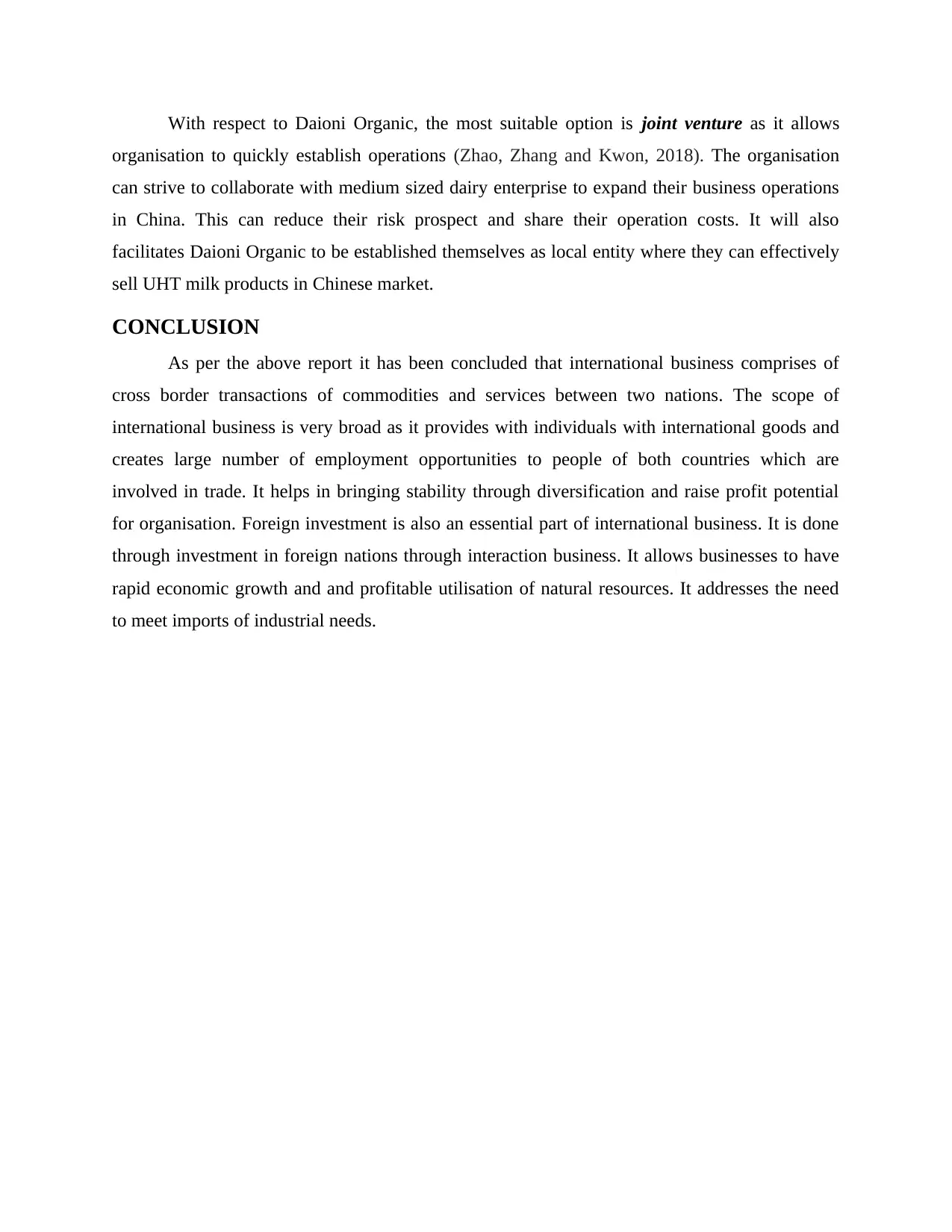
With respect to Daioni Organic, the most suitable option is joint venture as it allows
organisation to quickly establish operations (Zhao, Zhang and Kwon, 2018). The organisation
can strive to collaborate with medium sized dairy enterprise to expand their business operations
in China. This can reduce their risk prospect and share their operation costs. It will also
facilitates Daioni Organic to be established themselves as local entity where they can effectively
sell UHT milk products in Chinese market.
CONCLUSION
As per the above report it has been concluded that international business comprises of
cross border transactions of commodities and services between two nations. The scope of
international business is very broad as it provides with individuals with international goods and
creates large number of employment opportunities to people of both countries which are
involved in trade. It helps in bringing stability through diversification and raise profit potential
for organisation. Foreign investment is also an essential part of international business. It is done
through investment in foreign nations through interaction business. It allows businesses to have
rapid economic growth and and profitable utilisation of natural resources. It addresses the need
to meet imports of industrial needs.
organisation to quickly establish operations (Zhao, Zhang and Kwon, 2018). The organisation
can strive to collaborate with medium sized dairy enterprise to expand their business operations
in China. This can reduce their risk prospect and share their operation costs. It will also
facilitates Daioni Organic to be established themselves as local entity where they can effectively
sell UHT milk products in Chinese market.
CONCLUSION
As per the above report it has been concluded that international business comprises of
cross border transactions of commodities and services between two nations. The scope of
international business is very broad as it provides with individuals with international goods and
creates large number of employment opportunities to people of both countries which are
involved in trade. It helps in bringing stability through diversification and raise profit potential
for organisation. Foreign investment is also an essential part of international business. It is done
through investment in foreign nations through interaction business. It allows businesses to have
rapid economic growth and and profitable utilisation of natural resources. It addresses the need
to meet imports of industrial needs.
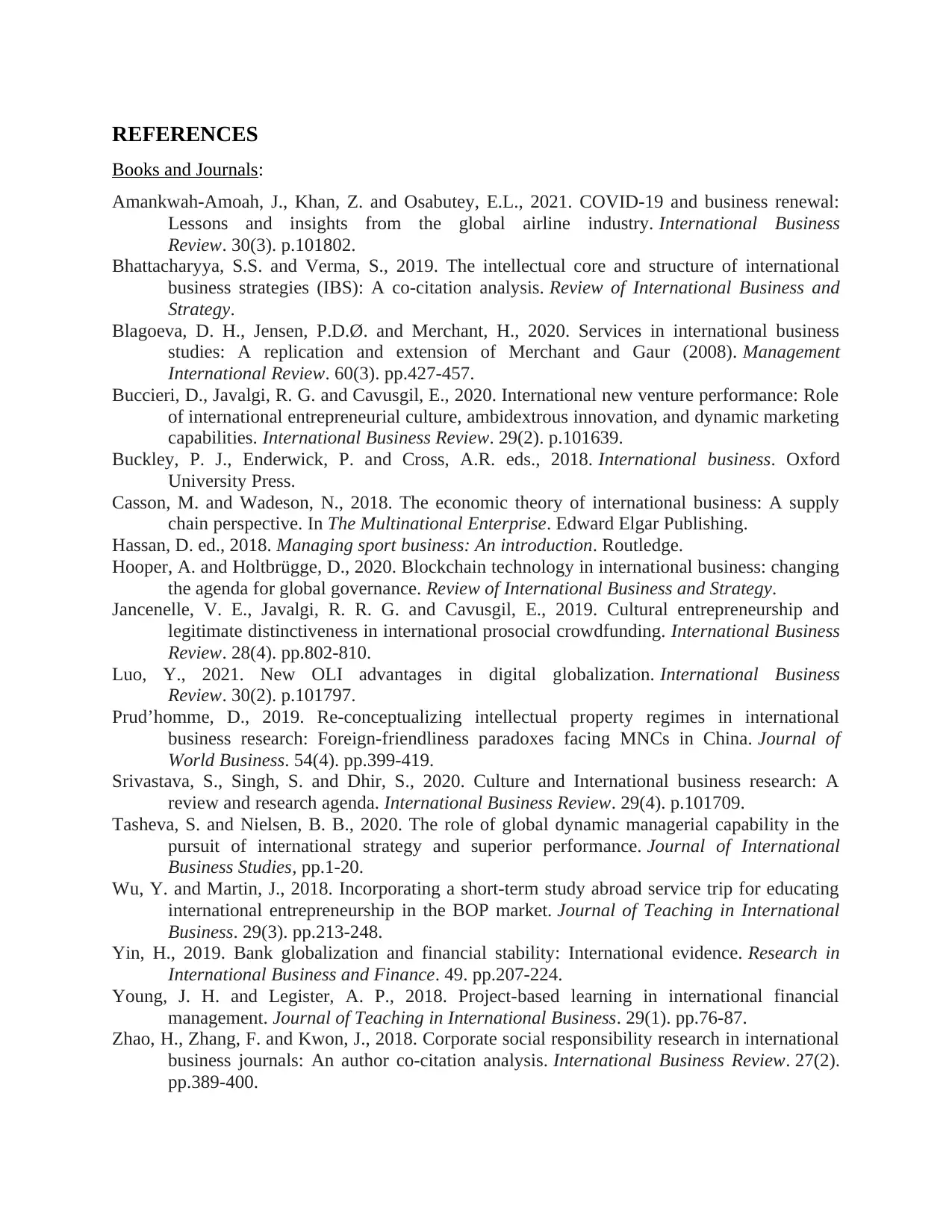
REFERENCES
Books and Journals:
Amankwah-Amoah, J., Khan, Z. and Osabutey, E.L., 2021. COVID-19 and business renewal:
Lessons and insights from the global airline industry. International Business
Review. 30(3). p.101802.
Bhattacharyya, S.S. and Verma, S., 2019. The intellectual core and structure of international
business strategies (IBS): A co-citation analysis. Review of International Business and
Strategy.
Blagoeva, D. H., Jensen, P.D.Ø. and Merchant, H., 2020. Services in international business
studies: A replication and extension of Merchant and Gaur (2008). Management
International Review. 60(3). pp.427-457.
Buccieri, D., Javalgi, R. G. and Cavusgil, E., 2020. International new venture performance: Role
of international entrepreneurial culture, ambidextrous innovation, and dynamic marketing
capabilities. International Business Review. 29(2). p.101639.
Buckley, P. J., Enderwick, P. and Cross, A.R. eds., 2018. International business. Oxford
University Press.
Casson, M. and Wadeson, N., 2018. The economic theory of international business: A supply
chain perspective. In The Multinational Enterprise. Edward Elgar Publishing.
Hassan, D. ed., 2018. Managing sport business: An introduction. Routledge.
Hooper, A. and Holtbrügge, D., 2020. Blockchain technology in international business: changing
the agenda for global governance. Review of International Business and Strategy.
Jancenelle, V. E., Javalgi, R. R. G. and Cavusgil, E., 2019. Cultural entrepreneurship and
legitimate distinctiveness in international prosocial crowdfunding. International Business
Review. 28(4). pp.802-810.
Luo, Y., 2021. New OLI advantages in digital globalization. International Business
Review. 30(2). p.101797.
Prud’homme, D., 2019. Re-conceptualizing intellectual property regimes in international
business research: Foreign-friendliness paradoxes facing MNCs in China. Journal of
World Business. 54(4). pp.399-419.
Srivastava, S., Singh, S. and Dhir, S., 2020. Culture and International business research: A
review and research agenda. International Business Review. 29(4). p.101709.
Tasheva, S. and Nielsen, B. B., 2020. The role of global dynamic managerial capability in the
pursuit of international strategy and superior performance. Journal of International
Business Studies, pp.1-20.
Wu, Y. and Martin, J., 2018. Incorporating a short-term study abroad service trip for educating
international entrepreneurship in the BOP market. Journal of Teaching in International
Business. 29(3). pp.213-248.
Yin, H., 2019. Bank globalization and financial stability: International evidence. Research in
International Business and Finance. 49. pp.207-224.
Young, J. H. and Legister, A. P., 2018. Project-based learning in international financial
management. Journal of Teaching in International Business. 29(1). pp.76-87.
Zhao, H., Zhang, F. and Kwon, J., 2018. Corporate social responsibility research in international
business journals: An author co-citation analysis. International Business Review. 27(2).
pp.389-400.
Books and Journals:
Amankwah-Amoah, J., Khan, Z. and Osabutey, E.L., 2021. COVID-19 and business renewal:
Lessons and insights from the global airline industry. International Business
Review. 30(3). p.101802.
Bhattacharyya, S.S. and Verma, S., 2019. The intellectual core and structure of international
business strategies (IBS): A co-citation analysis. Review of International Business and
Strategy.
Blagoeva, D. H., Jensen, P.D.Ø. and Merchant, H., 2020. Services in international business
studies: A replication and extension of Merchant and Gaur (2008). Management
International Review. 60(3). pp.427-457.
Buccieri, D., Javalgi, R. G. and Cavusgil, E., 2020. International new venture performance: Role
of international entrepreneurial culture, ambidextrous innovation, and dynamic marketing
capabilities. International Business Review. 29(2). p.101639.
Buckley, P. J., Enderwick, P. and Cross, A.R. eds., 2018. International business. Oxford
University Press.
Casson, M. and Wadeson, N., 2018. The economic theory of international business: A supply
chain perspective. In The Multinational Enterprise. Edward Elgar Publishing.
Hassan, D. ed., 2018. Managing sport business: An introduction. Routledge.
Hooper, A. and Holtbrügge, D., 2020. Blockchain technology in international business: changing
the agenda for global governance. Review of International Business and Strategy.
Jancenelle, V. E., Javalgi, R. R. G. and Cavusgil, E., 2019. Cultural entrepreneurship and
legitimate distinctiveness in international prosocial crowdfunding. International Business
Review. 28(4). pp.802-810.
Luo, Y., 2021. New OLI advantages in digital globalization. International Business
Review. 30(2). p.101797.
Prud’homme, D., 2019. Re-conceptualizing intellectual property regimes in international
business research: Foreign-friendliness paradoxes facing MNCs in China. Journal of
World Business. 54(4). pp.399-419.
Srivastava, S., Singh, S. and Dhir, S., 2020. Culture and International business research: A
review and research agenda. International Business Review. 29(4). p.101709.
Tasheva, S. and Nielsen, B. B., 2020. The role of global dynamic managerial capability in the
pursuit of international strategy and superior performance. Journal of International
Business Studies, pp.1-20.
Wu, Y. and Martin, J., 2018. Incorporating a short-term study abroad service trip for educating
international entrepreneurship in the BOP market. Journal of Teaching in International
Business. 29(3). pp.213-248.
Yin, H., 2019. Bank globalization and financial stability: International evidence. Research in
International Business and Finance. 49. pp.207-224.
Young, J. H. and Legister, A. P., 2018. Project-based learning in international financial
management. Journal of Teaching in International Business. 29(1). pp.76-87.
Zhao, H., Zhang, F. and Kwon, J., 2018. Corporate social responsibility research in international
business journals: An author co-citation analysis. International Business Review. 27(2).
pp.389-400.
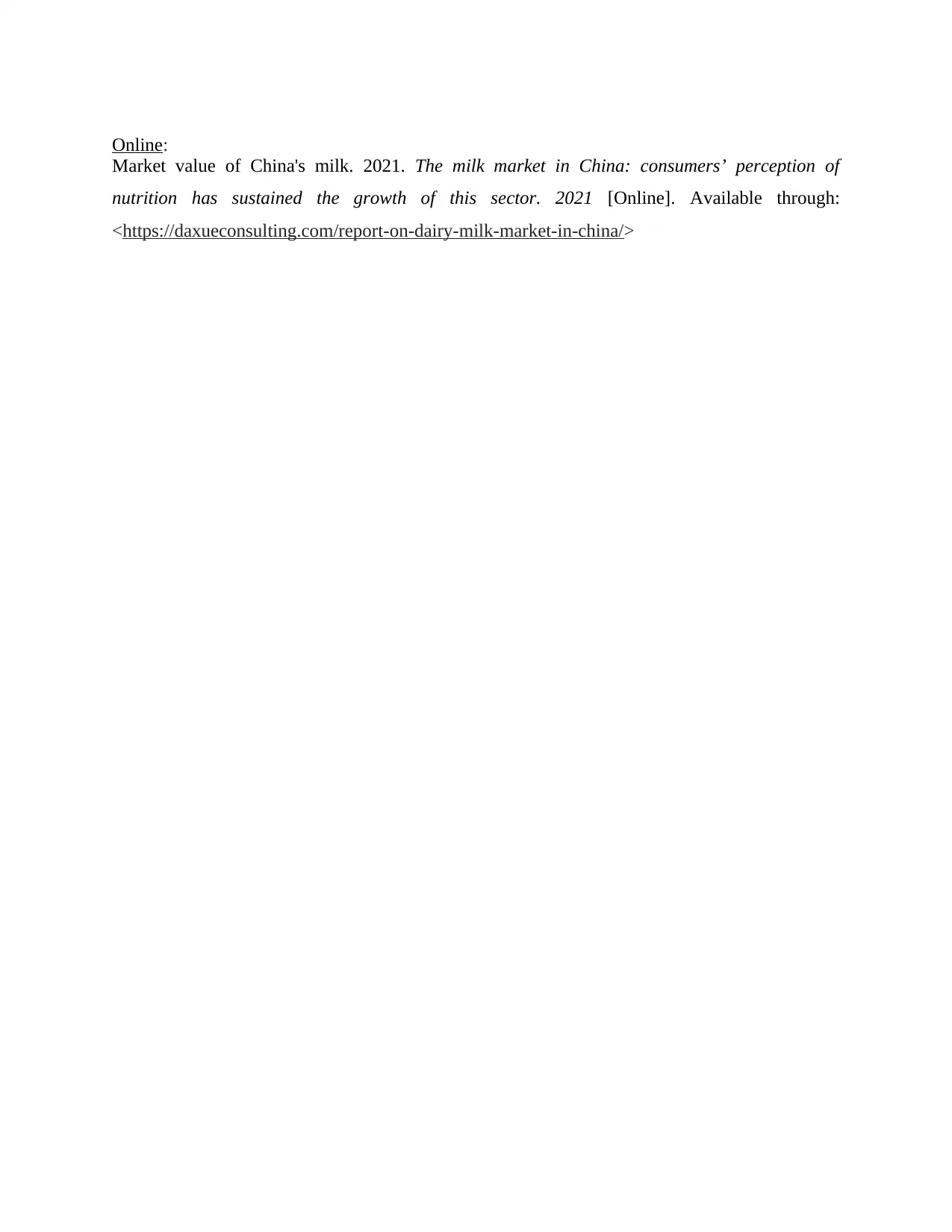
Online:
Market value of China's milk. 2021. The milk market in China: consumers’ perception of
nutrition has sustained the growth of this sector. 2021 [Online]. Available through:
<https://daxueconsulting.com/report-on-dairy-milk-market-in-china/>
Market value of China's milk. 2021. The milk market in China: consumers’ perception of
nutrition has sustained the growth of this sector. 2021 [Online]. Available through:
<https://daxueconsulting.com/report-on-dairy-milk-market-in-china/>
1 out of 16
Related Documents
Your All-in-One AI-Powered Toolkit for Academic Success.
+13062052269
info@desklib.com
Available 24*7 on WhatsApp / Email
![[object Object]](/_next/static/media/star-bottom.7253800d.svg)
Unlock your academic potential
© 2024 | Zucol Services PVT LTD | All rights reserved.





